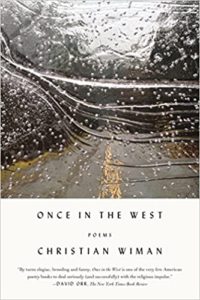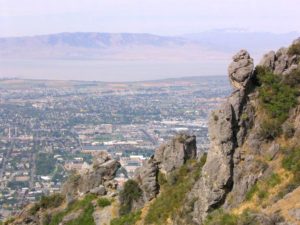An essay for the BYU “Literature and Spirituality” course, taught by Matthew Wickman.
The COVID-19 pandemic has brought about feelings of uncertainty, distress, and fear for many people across the world. Loss of health, loss of work, and loss of certainty in future plans or goals pervade each person’s life in varied and individual ways. One day in March, during the first days of the pandemic’s initial closure of school and businesses across the country, I reached a point of overwhelming frustration with the newly uncontrollable and unknowable variables that had entered into my life. I felt like I needed an escape.
I got into my car and drove up into the tree streets, a collection of neighborhoods perched along the Wasatch Mountains above Provo, Utah. After driving aimlessly through the winding roads, I drove through and beyond a neighborhood at the highest elevation above the rest of the city, a place where the houses, streets, and signposts stopped and met the unpopulated mountain. I parked my car and began clambering up the side of steep mountain, ascending about 50-75 yards up the mountain face. Eventually I stopped and turned to face the city below. Panting slightly from the steepness of my climb, I located a suitable boulder and sat down looking out across the lights dazzling and twinkling across the horizon. It was quiet…
I sat and stared, freed momentarily from the burden of thinking about anything in particular. No thoughts. Just feelings. I then began to talk aloud without planning what words I was to say, just talking with whoever or whatever I hoped would hear me. But I eventually reached a point that I couldn’t vocalize anything, so I just sat and felt all of my emotion, anger, frustration, and sorrow to the God that, in that moment, seemed so distant… It was loud… And then, as with my words, my feelings also exhausted themselves. The silence returned.
Literary Prayers
In a way, my speaking and feeling on that mountainside could be called a prayer. Though I agree that this would be the most accurate way to describe what I was doing that night in March, I’ve reflected more recently on the ways that this particular prayer was a different sort of prayer. Unlike the prayers of my childhood, I was not reciting a list of “grateful for’s” and “please bless’s.” Unlike the prayers of my mission, I was not imploring the Lord for inspiration in finding and teaching people the Gospel, for aid in learning a language, or for patience in living with a given companion. The prayer on that boulder was different. It was chaotic and scattered, fraught with frantic uncertainty and deep feeling, sublime in its striving towards divine communion, yet prosaic in its focus on quotidian frustrations and everyday experience. In a way, the prayer was literary. Like many works of literature, the prayer was an amalgam of sublimity and mundanity, of suffering and reflection.
 Christian Wiman, an American poet and theologian, opens his 2014 collection Once in the West with an introductory poem titled “Prayer.” The poem describes both the experience of suffering and the act of praying for relief from suffering as literary actions, as phenomena possessing the features, feelings, even physical forms of reading literature. He describes “the pain . . . latent / in the very grain / of being” by using words reminiscent of books and printed words on pages, writing of a “nightfall / neverness / inking into” the heart which causes a “smear / of spirit.” Wiman then writes that “words”—implying both words broadly and the very words of the poem—“intuit / and inter” the inky and smeared suffering endemic to “being” or living. Words are for Wiman, inherently intuitive of and equipped to “inter” or lay to rest the suffering we encounter in the course of life. To this end, the poem ends a plea and promise about this particular poem and those that will come within the collection as a whole. He writes:
Christian Wiman, an American poet and theologian, opens his 2014 collection Once in the West with an introductory poem titled “Prayer.” The poem describes both the experience of suffering and the act of praying for relief from suffering as literary actions, as phenomena possessing the features, feelings, even physical forms of reading literature. He describes “the pain . . . latent / in the very grain / of being” by using words reminiscent of books and printed words on pages, writing of a “nightfall / neverness / inking into” the heart which causes a “smear / of spirit.” Wiman then writes that “words”—implying both words broadly and the very words of the poem—“intuit / and inter” the inky and smeared suffering endemic to “being” or living. Words are for Wiman, inherently intuitive of and equipped to “inter” or lay to rest the suffering we encounter in the course of life. To this end, the poem ends a plea and promise about this particular poem and those that will come within the collection as a whole. He writes:
even now,
my prayer
is that a mind
blurred
by anxiety
or despair
might find
here
a trace
of peace.[1]
I’ve italicized the word “here” to emphasize to the immediacy of the poem’s and Wiman’s prayer, for it is not just a broad mission statement, a generalized hope or wish. Rather, it is happening “here,” on the paper where the word is printed as well as on the pages where the poem and its fellows literally lie. The poem is itself a prayer, a call for divine aid in transforming the words of poetry and literature into pieces of God’s grace.
For me, Wiman’s “Prayer” transforms prayer, its motivations, actions, and affects, into a literary act, a practice engaged simultaneously in ardent expression of emotion, earnest seeking of truth, and heartfelt pursuit of understanding. I’ve come to see my prayer that day in March, and the practice of prayer generally, as a literary endeavor, as a mode of accessing, in Wiman’s words, traces of peace and flashes of understanding amidst life’s ebb and flow of suffering and difficulty.
Prayerful Literature
Coming to understand my prayer, and the act of praying broadly, as an inherently literary act has come by way of literature as much as through specific religious practice. To me, literature can be as prayerful in content and affect as prayer is literary in quality and experience. I’ve come to this realization more firmly each time I’ve walked past a sign hanging in the BYU library stairwell on which quotes words from Doctrine and Covenants 88:118: “seek ye diligently and teach one another words of wisdom; yea, seek ye out of the best books words of wisdom; seek learning, even by study and also by faith.”
Though these words are well-known and oft-quoted, I feel I’ve sometimes overlooked the rich reciprocity existing between work of the spirit and the works of humankind. To me, this verse invites and encourages multidirectional exchange between God’s works and words and the works and words wrought by human hands and minds. In seeking out works and texts that synthesize the humanist with the heavenly, I’ve come to treasure certain works of literature alongside the words of scripture, even when those literary texts appear ill-suited for a Sunday School lesson.
 I recently encountered a piece of what I would call prayerful literature while taking a class about the American novel. We concluded our semester together by reading and discussing Cormac McCarthy’s The Road, a book that, based on the back-cover synopsis, I did not expect to characterize as “prayerful” literature. Despite the book’s morbid post-apocalyptic setting, bleak prose, and disturbing portrayals of human evil, the two main characters, a father and son, express a deep and simple form of love and protection for each other. Throughout their journey, the father and son frequently tell each other that they are “carrying the fire” along the dark Appalachian road.[2] They recite this ambiguous yet stirring phrase both during prolonged periods of suffering and in ephemeral moments of relief and peace. To me, McCarthy’s application of the phrase in moments of both danger and peace gives it a distinctively prayerful quality. The father and son’s “carrying the fire” recalled to me the silent prayers of Alma and his people who under the oppression of Amulon and the Lamanites “did not raise their voices to the Lord their God, but did pour out their hearts to him” continually.[3]
I recently encountered a piece of what I would call prayerful literature while taking a class about the American novel. We concluded our semester together by reading and discussing Cormac McCarthy’s The Road, a book that, based on the back-cover synopsis, I did not expect to characterize as “prayerful” literature. Despite the book’s morbid post-apocalyptic setting, bleak prose, and disturbing portrayals of human evil, the two main characters, a father and son, express a deep and simple form of love and protection for each other. Throughout their journey, the father and son frequently tell each other that they are “carrying the fire” along the dark Appalachian road.[2] They recite this ambiguous yet stirring phrase both during prolonged periods of suffering and in ephemeral moments of relief and peace. To me, McCarthy’s application of the phrase in moments of both danger and peace gives it a distinctively prayerful quality. The father and son’s “carrying the fire” recalled to me the silent prayers of Alma and his people who under the oppression of Amulon and the Lamanites “did not raise their voices to the Lord their God, but did pour out their hearts to him” continually.[3]
However, unlike Alma and his people, who were miraculously led out of captivity and joyfully reunited with the Nephites in Zarahemla, the father and son’s carrying of the fire does not end joyfully. But it does end prayerfully. Following his father’s death, the boy continues (in his own way) to pray while journeying along the road. McCarthy writes that he “tried to talk to God but the best thing was to talk to his father and he did talk to him and he didn’t forget.”[4] Though no divine response comes in answer to the boy’s prayers, a certain divine presence, a heavenly assurance, accompanies the boy, for “the breath of God was his breath.”
Conclusion
The silence had returned. It settled around me again once I had run out of prayers, vocal and emotional. I had said and felt all that I thought I could toward God. As I sat on the boulder, I expected that “warmth” to creep through my heart, to heal and reassure me, to tell that things were going to be ok. But it didn’t come.
Instead, the silence intensified. Yet it now seemed not to voice an absence, but a presence. Somehow, it was accompanying me. As I puzzled over this, I recognized that my Heavenly Parents, Christ, and the Holy Ghost were indeed present and attentive to what I had vocally, mentally, and emotionally expressed on that mountainside. But they were not responding to my grief, to my frustration, or my sorrow. They accompanied it, recognized it, even honored it.
As I sat in this silence, a silence of acknowledgement and presence, I realized that this was the most loving response I could have received. Anything other than the accompanying and abiding presence of God in this moment would have felt, perhaps, fabricated and inauthentic. I now see this profound experience as a moment of literary prayer, a moment made clearer and more meaningful through prayerful literature.
[1] Wiman, Christian. “Prayer,” Once in the West, Farrar, Straus, and Giroux, 2014, pp. xi-xii.
[2] McCarthy, Cormac. The Road, Random House, 2006, pp. 83.
[3] Mosiah 24:12
[4] McCarthy, pp. 286.


Sam
Deeply insightful and powerful. I can witness with you the validity of your experience because as I read I could feel much of what you felt on the mountainside, so I too know that God is present at such times and acknowledges our expressions. Marvelous,
I am interested in the syllabus for the course Matthew teaches.
.
The beauty of The Road is something I didn’t really get a good view of until years after reading it. But by the the details had faded. Way to put it into focus for me!